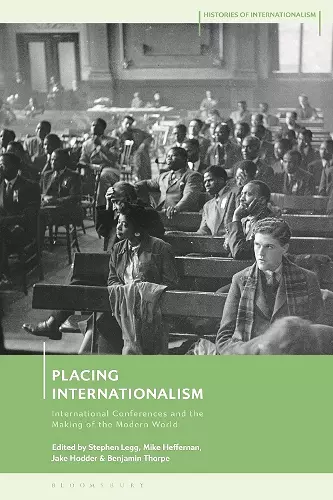Placing Internationalism
International Conferences and the Making of the Modern World
Benjamin Thorpe editor Mike Heffernan editor Stephen Legg editor Jake Hodder editor
Format:Paperback
Publisher:Bloomsbury Publishing PLC
Published:29th Jun '23
Currently unavailable, and unfortunately no date known when it will be back

A collection exploring the emergence of modern internationalism through international conferences from Paris 1919 to Bandung 1955.
Exploring how modern internationalism emerged as a negotiated process through international conferences, this edited collection studies the spaces and networks through which states, civil society institutions and anti-colonial political networks used these events to realise their visions of the international.
Taking an interdisciplinary approach, contributors explore the spatial paradox of two fundamental features of modern internationalism. First, internationalism demanded the overcoming of space, transcending the nation-state in search of the shared interests of humankind. Second, internationalism was geographically contingent on the places in which people came together to conceive and enact their internationalist ideas. From Paris 1919 to Bandung 1955 and beyond, this book explores international conferences as the sites in which different forms of internationalism assumed material and social form. While international ‘permanent institutions’ such as the League of Nations, UN and Institute of Pacific Relations constantly negotiated national and imperial politics, lesser-resourced political networks also used international conferences to forward their more radical demands.
Taken together these conferences radically expand our conception of where and how modern internationalism emerged, and make the case for focusing on internationalism
in a contemporary moment when its merits are being called into question.
It is commonplace to single out international conferences such as those at Paris in 1919 and at Bretton Woods in 1944 as important turning points in world history. This book reminds us how important conferences, easily dismissed as 'talking shops,' have been in the evolution of international cooperation in general. * John Agnew, Professor, UCLA, USA *
This volume presents a successful outcome of interdisciplinarity – to stimulate lively intellectual conversations. It makes an exciting intervention in our understanding of ‘the international’, with the critical scrutiny of geographers on what ‘place’ means, coupled with the depth of historical engagement that historians can offer. * Naoko Shimazu, Professor, Yale-NUS College and Asia Research Institute, National University of Singapore, Singapore *
If you think that international conferencing is not a practice you need to read up on, think again! This is a rich collection on the kinds of places that, while vital instruments of international governance, are often delegated to footnotes. An excellent read to those interested in international affairs. * Merje Kuus, Distinguished Professor of Geography, The University of British Columbia, Canada *
ISBN: 9781350247215
Dimensions: unknown
Weight: unknown
276 pages